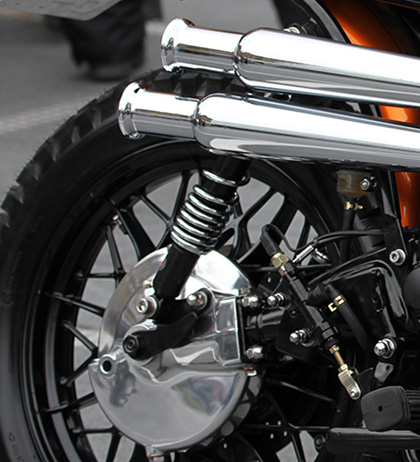 European/Global – ABS – Anti Lock Brakes – Advanced Braking Systems, whatever you wish to label them, are certainly marked out in the realms of ongoing motorcycling technical innovations as something that improves rider safety.
European/Global – ABS – Anti Lock Brakes – Advanced Braking Systems, whatever you wish to label them, are certainly marked out in the realms of ongoing motorcycling technical innovations as something that improves rider safety.
Any challenges about the ability of ABS not to stop in corners, on loose road surfaces while keeping the rider upright, has faded away as practical and “paper” research debunks any dissent, putting forward evidence that ABS saves riders lives.
As ABS moves technically forward, linked to more advanced electronics and other handling systems, some riders are still “fighting” about the technical cost aspects to riders, but the fact remains that ABS is here to stay.
At this present time any new type approved motorcycle that is over 125cc, to be sold in Europe, must have an ABS system fitted. This decision was taken by the European Union institutions, and eventually voted on and passed in 2012 for introduction this year (2016).
This introduction of the fitting of ABS on motorcycles is a foregone conclusion as the European Commission and Parliament in 2011 argued that ABS would reduce casualties by 20% over the next 10 years.
As yet mandatory ABS (in Europe) applies to those motorcycles or scooters over 125cc however the Commission has considered expanding their application to smaller PTWs (Powered Two Wheelers). At this point in time they have yet to make that decision.
While ABS is considered a panacea of technical ability to reduce motorcycle collisions and injuries and make a difference in ALL braking situations, rather than stop the motorcycle safely in specific scenarios, research to determine what happens when riders crash with ABS on their bikes is still very limited.
In other words, these braking systems on motorcycles are known to stop the brakes on a bike from locking.
But the information to tell us what the dynamics are in a crash scenario, remain hazy and limited.
For this reason, researchers in Europe (Italy, Greece, Austria and the UK) are looking to find answers by surveying motorcyclists who have experienced a crash with ABS between 2010 and 2015. The design of the survey – Dynamics of PTW crashes using ABS – has had the support and input of James Ouellet, a motorcycle accident analyst from Los Angeles.
This study aims to identify the dynamics of crashes between Powered Two Wheelers (PTWs: motorcycles or scooters) that have Advanced/Antilock Braking Systems (ABS) – and another vehicle, object or road/side.
To understand the specifics of the impact of the motorcycle with ABS and how this affects the rider in terms the trajectory of the rider post-impact and the type of possible injuries sustained by the rider. It doesn’t matter if there was only slight damage to the bike – any information from wherever you are that can help to understand what happens is very important.
The survey will be expanded into multiple languages, but for the time being the survey will be circulated in English only. The objective is to find out from riders, their experiences which will eventually be used to provide information to improve training and the technical development of future ABS.
All information is confidential and no personal identifying questions regarding the rider or the motorcycle/scooter will be asked.
If you require further details regarding the study, please contact Dr Elaine Hardy, the author of this survey – email
Please note the survey is now finished – read the report – Click Here
Survey at – Dynamics of PTW crashes using ABS
Source – www.motorcycleminds.org
Previous research by Dr Elaine Hardy – www.righttoride.org.uk


British Motorcyclists Federation (BMF) – Thanks due this time to the BMF for promoting the survey!
On Facebook
On Twitter
http://www.bmf.co.uk/
SMC Sveriges MotorCyklister & MC-Folket – The riders organisation in Sweden have shared the ABS survey – many thanks for their assistance in this.
On Facebook
About SMC – In English
Survival Kills – Thanks to Survival Skills for linking to the survey – Survival Skills provides a wide range of practical motorcycle training courses from convenient locations in England, Wales and Northern France, as well as distance learning options and free rider resources.
Their aim is to offer a practical training course that’s differentiated from standard Roadcraft-based “defensive riding” training, focussing instead on Risk Assessment and Risk Management techniques to really understand the concept of hazards and how to cope with them and still enjoy motorcycling.
On Facebook – http://www.survivalskills.co.uk
Australian Motorcycle Council – Even more thanks due for promoting the ABS Crash Survey – this time to the Australian Motorcycle Council – On Facebbook – http://www.amc.asn.au
The Rider’s Digest – More thanks for promoting the ABS survey – to The Rider’s Digest – rammed with writing about all things two-wheeled, all delivered in the uniquely real world style – On Facebbook – http://www.theridersdigest.co.uk
Road Safety GB – More thanks – this time to Road Safety GB for featuring the survey – New research seeks to shed light on PTW ABS collisions
Australia – Our thanks to Motorbike Writer in Australia for putting the ABS survey up – “Europe is mandating ABS on motorcycles and it is being considered in Australia but only now is a survey seeking to find out if ABS is safe in the real world. ……….seeking riders around the globe who have been involved in a crash on a bike fitted with ABS to fill out her survey.”
Link – Is ABS as safe as officials believe?
Motorbike Writer – On Facebook – On Twitter
Ireland – Or thanks to MAG Ireland – The Irish Motorcyclists’ Association for linking the survey to Irish motorcyclists.
MAG Ireland – Website – On Facebook – On Twitter
The only experience I’ve had with ABS was in the winter I broke for a junction ,the bike just kept on going straight across the road , all good nothing coming , don’t like ABS .